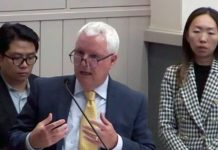
South Pasadena’s push to claw back the right to purchase Caltrans’ 12-unit residential property at 626 Prospect gained momentum June 24 when state Transportation Commissioners, annoyed about being “misled” by the agency over terms of the sale, deferred a decision pending a court hearing.
Meantime filings poured in ahead of the July 1 hearing in which the City hopes to win a preliminary injunction against Caltrans’ proposed sale of the property to the development arm of Pasadena’s Friendship Baptist Church.
The City originally sought a temporary restraining order (TRO) pending its application for a writ against the sale, but it was denied at a June 15 hearing by Judge Mary H. Strobel, who said there was “no exigency” since the escrow on Caltrans’ deal with Friendship Baptist was not imminent.
“It seems like every opportunity Caltrans has had to screw this up, they have,” said Commissioner Joseph Lyou. “I’m pretty disappointed.” He said he was “misled” by Caltrans when he was told that the CTC’s disapproval of the deal would result in a “breach of contract”; about why the City’s application for a TRO had been denied; and by Caltrans’ explanation of the next step it would take in the event of denial.
The staff who made the presentation included Carolyn Dabney, Caltrans’ Program Manager for State Route 710 Property Sales, and Kimberly Erickson, Right of Way and Land Surveys Division Chief.
Lyon, who earlier in the meeting had moved for conditional approval of the sale pending the court hearing, amended his motion to delay consideration to the Commission’s next two-day meeting on Aug. 18-19. All nine commissioners present voted for the delay. The board was heavily lobbied by supporters of South Pasadena’s position. Council Members John Primuth and Michael Cacciotti both spoke. Over two dozen emails were filed, including comments from former Mayors Marina Khubesrian and Richard Schneider.
Caltrans said it denied the City’s application because the City did not constitute a “public housing related entity” (HRE) as its application included an arrangement under which the property would be swiftly transferred to New Prospects Development, which is not an HRE, a private group of 626 residents, and also because even if it had qualified as an HRE, its bid was defective compared to Pasadena Friendship’s.
Meantime the parties filed briefs ahead of a July 1 hearing for a preliminary injunction. In its pleading, Caltrans argues the City’s application to acquire the property raised several concerns, including its plan for the “immediate transfer” of the property to New Prospect Development; its proposal to resell two of the 12 units at market value; its failure to provide for a “net equity” payment to the state’s low-income housing fund, and sale of two of the units at “income-qualified prices.”
The agency also said the City’s application was inferior to that of Pasadena Friendship in part because its agreement with NDP “creates an illusionary requirement for only six of the twelve units…to be used for affordable housing.” This, and the plan to sell two units at market, “demonstrate that the subject bid would result in fewer affordable housing units than proposed by Pasadena Friendship.”
In response, the City said that Caltrans misconstrued the legal standard required to issue a preliminary injunction because it “incorrectly asserts the City must demonstrate both likelihood of success on the merits and the balance of harms in its favor.” It argues a likelihood of success is sufficient, and that Caltrans has a “ministerial duty” to offer the property to the City.
It also said Caltrans offered “circular” reasoning regarding the issue of immediate transfer and that there was no prohibition to selling to current tenants at fair market value or to income-qualified buyers at affordable rates. “Caltrans claims that the City’s offer is unacceptable because the City proposes to resell individual units to current residents,” the City observed. “Caltrans would rather have the City offer current residents the entire building. This interpretation adds the word ‘entire’ to the Affordable Sales Program and leads to absurd results, as happened here,” because Pasadena Friendship offered to resell the entire building to the residents of a single unit for $3.2 million. “No reasonable definition of ‘affordable price’ can mean tenants of affordable housing must pay $3.2 million to obtain homeownership.” Moreover, “no single tenant can ‘occupy’ an entire multifamily residential property.”
The City also said Caltrans’ argument that the City allegedly failed to accept an earlier 2016 offer had long since been waived by actions Caltrans took subsequently in processing the City’s newer application, and because it failed to mention this argument until it filed its brief.




















.png)









